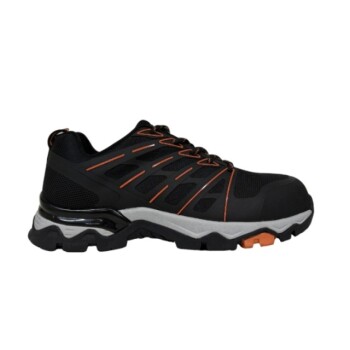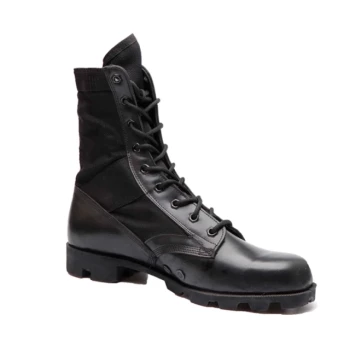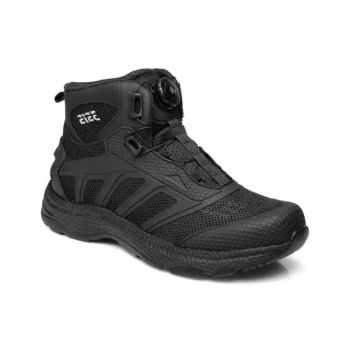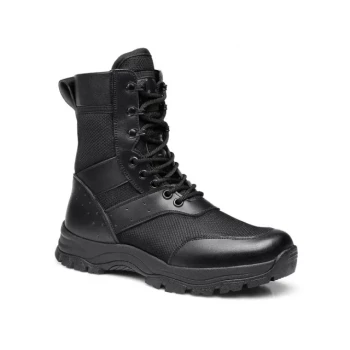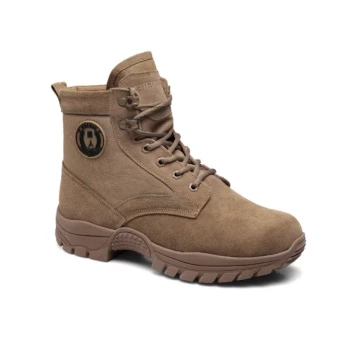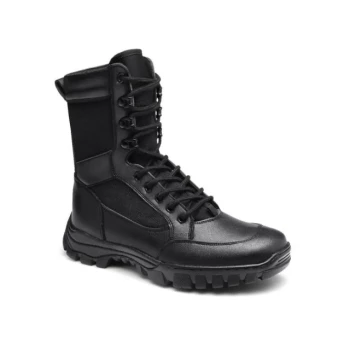Wellington boots, commonly referred to as "wellies," are tall, waterproof footwear constructed from natural rubber or PVC designed to provide absolute protection against wet and muddy conditions. They are best suited for activities involving deep mud, standing water, and casual outdoor tasks such as gardening, farming, and attending festivals where keeping feet dry and clean is the primary objective.
While Wellington boots are the superior choice for standing water and muck, they often lack the ankle support required for technical terrain. Their core value lies in impenetrable weather protection and ease of cleaning rather than long-distance ergonomic support.
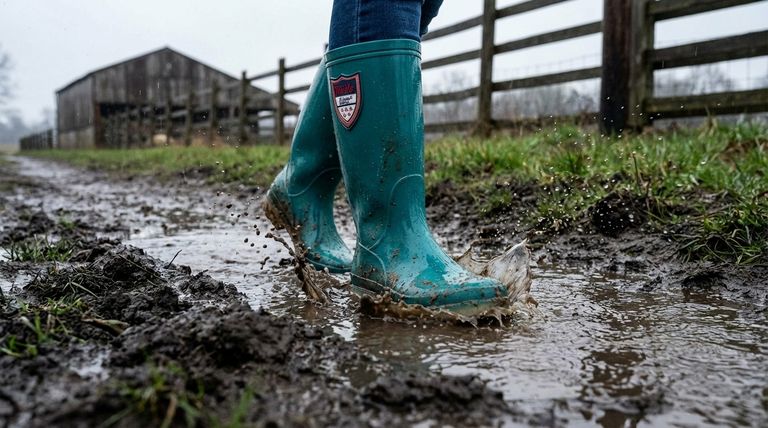
The Anatomy of Weather Protection
Waterproof Construction
The defining feature of a Wellington boot is its material composition, typically rubber or PVC.
Unlike water-resistant hiking boots, wellies are 100% waterproof, creating an impermeable barrier against boggy ground and puddles.
Low Maintenance
Because of their smooth, non-porous exterior, these boots are exceptionally easy to clean.
Mud, dirt, and debris can simply be rinsed off with a hose, making them ideal for high-mess environments like farms or muddy festival grounds.
Performance in Extreme Conditions
Thermal Insulation
Standard rubber boots can be cold, but high-quality models designed for winter feature neoprene linings (often up to 5mm) or fleece.
These insulated models are critical for trapping heat, making the boots suitable for snow and freezing temperatures.
Advanced Traction
While basic wellies can be slippery, performance models utilize super-sturdy soles, such as Vibram.
These feature deep tread patterns designed to provide grip on icy surfaces and maintain traction in slick mud.
Comfort Features
Modern high-end boots often include shock-absorbing cushions and breathable linings to mitigate the "sweaty" feeling common with rubber footwear.
Adjustable gussets are also a key feature in women's boots, allowing for a customized fit around the calf.
Understanding the Trade-offs
The "Walking" Misconception
While wellies are suitable for walking in wet conditions, not all models are designed for long distances.
Standard versions often lack the structural support necessary for a long hike, potentially leading to foot fatigue.
Stability vs. Protection
For uneven terrain or long treks, dedicated walking boots are generally recommended over Wellingtons.
Walking boots provide superior ankle control and grip. However, if you must hike in deep mud, you must select high-specification Wellingtons with reinforced, slip-resistant soles to bridge the gap between protection and support.
Making the Right Choice for Your Goal
To ensure you select the correct footwear for your specific environment, consider the following:
- If your primary focus is stationary outdoor tasks (Gardening/Farming): Prioritize standard rubber or PVC models that are easy to rinse and fully waterproof.
- If your primary focus is winter activity: Choose boots with 5mm neoprene insulation or fleece lining to prevent heat loss in freezing conditions.
- If your primary focus is long-distance dog walking: Invest in high-end models with Vibram soles and shock absorption to mimic the comfort of a hiking boot.
Select the boot that balances your need for absolute waterproofing with the physical demands of your terrain.
Summary Table:
| Feature | Benefit | Best For |
|---|---|---|
| Waterproof Rubber/PVC | Impermeable barrier against water and mud | Gardening, Farming, Festivals |
| Easy-Clean Exterior | Mud and debris rinse off easily | High-mess environments |
| Neoprene/Fleece Lining | Thermal insulation for cold weather | Winter activities, snow |
| Vibram/Advanced Soles | Superior grip on slippery surfaces | Icy conditions, slick mud |
| Shock Absorption | Enhanced comfort for walking | Long-distance dog walking |
Need Reliable Wellington Boots for Your Business?
As a large-scale manufacturer, 3515 produces a comprehensive range of durable Wellington boots for distributors, brand owners, and bulk clients. Our production capabilities ensure top-quality footwear with features like 100% waterproofing, advanced traction soles, and thermal insulation, perfectly suited for your customers' needs in agriculture, outdoor events, and more.
Contact us today to discuss your requirements and leverage our expertise in protective footwear manufacturing.
Visual Guide
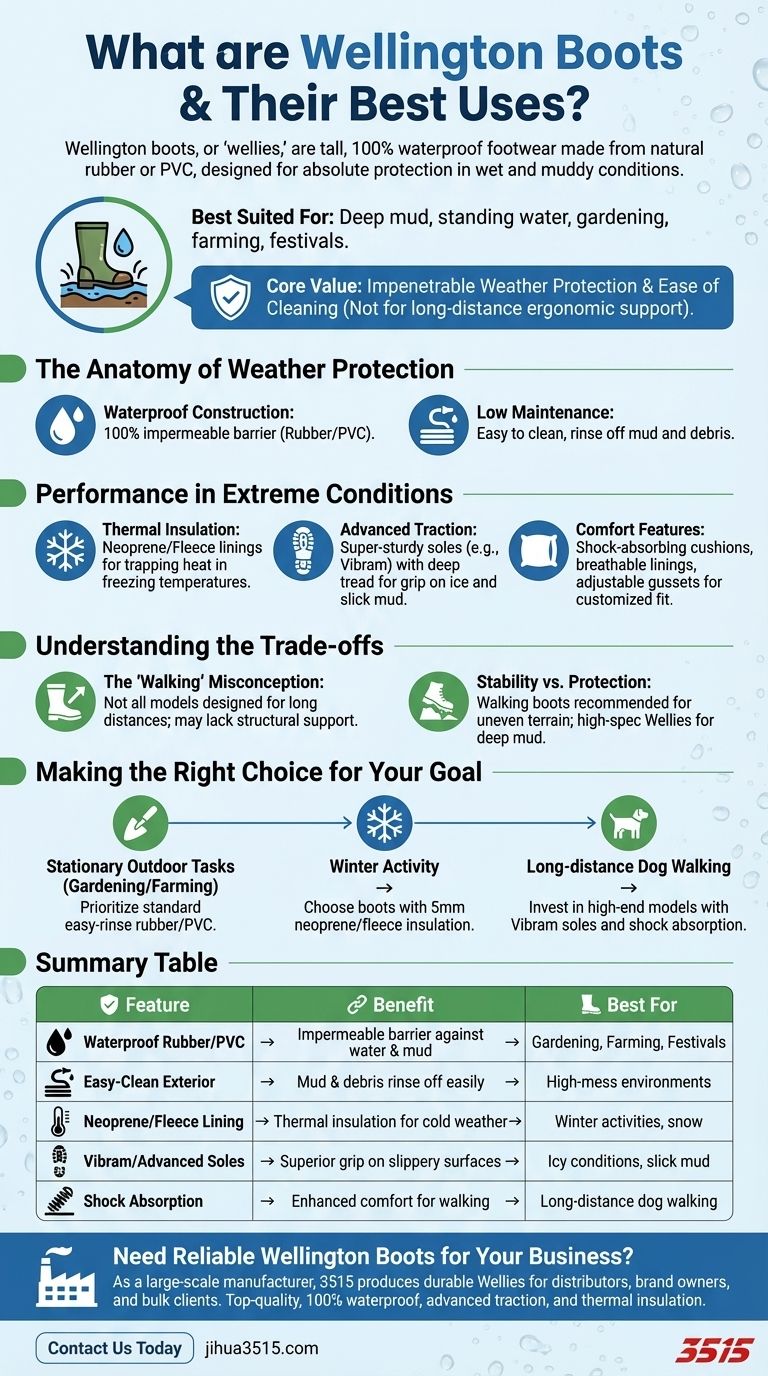
Related Products
- Factory Direct Wholesale Rain Boots Durable Waterproof & Fully Customizable
- Factory-Direct Wholesale Canvas Boots with High-Traction Rubber Soles
- High Performance Fire-Retardant Waterproof Safety Boots
- Wholesale Leather Safety Boots with Customizable Protective Toe
- Premium KPU Injection Athletic Style Safety Shoes
People Also Ask
- What should be done if someone is in-between sizes when selecting Wellington boots? Size Up for the Perfect Fit
- How should you clean the outside of rubber boots? The Simple Guide to Extend Their Lifespan
- What are wellies and why are they significant in British culture? A Symbol of Resilience
- Are Wellington boots supposed to be loose? Find the Perfect Fit for Comfort & Performance
- What are the main materials for waterproof rain boots? Choose the Right Material for Durability & Comfort
- How should Wellington boots be dried? Avoid Cracks and Extend Their Lifespan
- Why is grip and traction important in women's wellies? Essential for Safety and Stability
- What is the cultural impact of Wellington boots? From Battlefields to Fashion Runways




